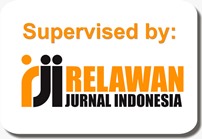THE RELATIONSHIP BETWEEN DEBT AND TOBACCO EXCISE TAX INCREASES WITH CIGARETTE COMPANY STOCK PRICES
Abstract
Full Text:
PDF (Bahasa Indonesia)References
Ai, H., Frank, M. Z., & Sanati, A. (2020). The trade-off theory of corporate capital structure. https://doi.org/10.1093/acrefore/9780190625979.013.602
Ainun, M. B. (2020). Efek Moderasi Kebijakan Hutang Pada Pengaruh Kebijakan Dividen Terhadap Harga Saham. Ekuitas (Jurnal Ekonomi Dan Keuangan), 3(3), 382–402. https://doi.org/10.24034/j25485024.y2019.v3.i3.4192
Bella, A., Swarnata, A., Vulovic, V., Nugroho, D., Meilissa, Y., Usman, U., & Dartanto, T. (2024). Macroeconomic impact of tobacco taxation in Indonesia. Tobacco Control, 33(Suppl 2), s108–s114. https://doi.org/10.1136/tc-2022-057735
Fauzi, M. Z., & Rochmatullah, M. R. (2024). Analysis Of Stock Performance In Technology Sector Companies Listed On Idx 2021-2022: Indonesia Point Of View. Transekonomika: Akuntansi, Bisnis Dan Keuangan, 4(5), 621–635. https://doi.org/10.55047/transekonomika.v4i5.737
Hartono, J. (2020). Teori portofolio dan analisis investasi. UGM Press.
Haslinda, D. A., & Triyonowati, T. (2020). Pengaruh Pengumuman Kenaikan Tarif Cukai Rokok Terhadap Harga Saham industri Rokok di BEI. Jurnal Ilmu Dan Riset Manajemen (JIRM), 9(3).
Hutauruk, M. R. (2023). Exploring the paradox: How cigarette excise tax affects firm value with firm size and profitability as key moderators. European Research Studies Journal, 26(2), 794–821.
Jihadi, M., Vilantika, E., Hashemi, S. M., Arifin, Z., Bachtiar, Y., & Sholichah, F. (2021). The effect of liquidity, leverage, and profitability on firm value: Empirical evidence from Indonesia. The Journal of Asian Finance, Economics and Business, 8(3), 423–431. https://doi.org/10.13106/jafeb.2021.vol8.no3.0423
Latifah, H. C., & Suryani, A. W. (2020). Pengaruh kebijakan dividen, kebijakan hutang, profitabilitas, dan likuiditas terhadap harga saham. Jurnal Akuntansi Aktual, 7(1), 31–44. https://doi.org/10.17977/um004v7i12020p31
Lazulva, I., & Yuniati, T. (2024). Pengaruh Kebijakan Hutang, Firm Size, Profitabilitas Terhadap Harga Saham Pada Perusahaan Food and Beverage di BEI. Jurnal Ilmu Dan Riset Manajemen (JIRM), 13(4).
Lubis, T. A. (2016). Manajemen Investasi dan Perilaku Keuangan (Pendekatan Teoritis dan Empiris). Salim Media Indonesia (Anggota IKAPI).
Mangande, N., & Yuli, A. (2025). The Effect of Profitability and Leverage on Stock Prices with Company Size as a Control Variable (Empirical Study on Manufacturing Companies Listed on the Indonesia Stock Exchange 2019-2023). Journal of Economics and Social Sciences (JESS), 4(1), 171–178. https://doi.org/10.59525/jess.v4i1.699
Mgammal, M. H. (2024). The impact of tobacco taxes, VAT, and affordability on the human development index: a global perspective on future economic trends. Cogent Economics & Finance, 12(1). https://doi.org/10.1080/23322039.2024.2429771
Mustaqiem. (2014). Perpajakan dalam konteks teori dan hukum pajak di Indonesia. Buku Litera Yogyakarta.
Peng, Z., & Hu, C. (2020). The threshold effect of leveraged trading on the stock price crash risk: evidence from China. Entropy, 22(3), 268. https://doi.org/10.3390/e22030268
Purnomo, R. A. (2016). Analisis Statistik Ekonomi dan Bisnis Dengan SPSS. Wade Group.
Sadeghian, N. S., Latifi, M. M., Soroush, S., & Aghabagher, Z. T. (2012). Debt Policy and Corporate Performance: Empirical Evidence from Tehran Stock Exchange Companies. International Journal of Economics and Finance, 4(11). https://doi.org/10.5539/ijef.v4n11p217
Sheikh, Z. D., Branston, J. R., & Gilmore, A. B. (2023). Tobacco industry pricing strategies in response to excise tax policies: a systematic review. Tobacco Control, 32(2), 239–250.
Sunardi, N., Husain, T., & Kadim, A. (2020). Determinants of Debt Policy and Company’s Performance. International Journal of Economics and Business Administration, VIII(Issue 4), 204–213. https://doi.org/10.35808/ijeba/580
Tandelilin, E. (2017). Pasar modal manajemen portofolio & investasi. Yogyakarta: PT Kanisius.
Zulfikar. (2016). Pengantar pasar modal dengan pendekatan statistika. CV Budi Utama.
DOI: https://doi.org/10.31846/jae.v13i3.986
Refbacks
- There are currently no refbacks.

This work is licensed under a Creative Commons Attribution-NonCommercial-NoDerivatives 4.0 International License.
e-Jurnal Apresiasi Ekonnomi Indexed by:












